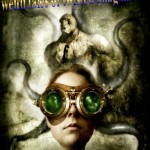Bradley P Beaulieu came 2nd in the 2004 Writers of the Future contest, and has subsequently sold short stories to Realms of Fantasy and Orson Scott Card’s Intergalactic Medicine Show. His first novel, The Winds of Khalakovo will be published in April 2011 by Night Shade Books — it is the first volume of The Lays of Anyushka trilogy. He’s stopped by to answer a few questions. 
So to begin, if you could pick anyone at all, who would you most like to meet?
Anyone alive? I’d probably pick Cate Blanchett. She’s such an interesting actress. She’s so good at her art, and I think it would be fun to talk to her about her process, how she prepares for roles. And I suppose it doesn’t hurt that she’s beautiful, nor that she played the part of one of the more interesting characters in The Lord of the Rings.
Anyone at all? This may sound a bit easy, but I’d love to talk to J.R.R. Tolkien. He came from a different time, and has paved the way for so much that followed. It would be interesting, not only to talk to him about his writing, but to let him know how much he means to so many others, including me.
You like spicy food. What dish do you most like to cook?
My favorite recipe is one I haven’t tried before. I love cooking, but I still have a lot to learn. There are a ton of things I haven’t made yet, even mainstays in traditional western cooking. When I was living in California, I fell in love with fish tacos, especially Ensenada style fish tacos. The fish is deep fried in light batter and then put on a bed of white cabbage or lettuce over fresh corn tortillas and topped with a light sour cream sauce and cilantro and light Mexican cheese. I tried quite a few places until I found the on I liked the best, and then I tried recreating the recipe. I’m pretty close now. The batter’s tricky to get right, as is the frying of it, but I’ve experimented with a few sauces, and I’m pretty happy with the recipe now. The traditional recipe doesn’t have a ton of spice, but I have a spicy tomatillo sauce and I add chipotle puree to the sour cream sauce to add some zing. When I get it right, it’s one of the best meals I make.
 Tell us about your fantasy kingdom – what cultures and/or countries have you drawn inspiration from?
Tell us about your fantasy kingdom – what cultures and/or countries have you drawn inspiration from?The Winds of Khalakovo draws heavily from Muscovite Russia and ancient Persia (and also a bit from the Ottoman Empire, though that has much more play in Book 2,
The Straits of Galahesh). Perhaps not so obviously, I draw heavily from Buddhism as well. It was the central belief system I started with when I was in those earliest of brainstorming sessions. I’d determined early on that the most common form of magic would be commanded by a select few people, and that because of their beliefs they would be used by others who are not so caring as they. From this mindset sprung the Aramahn, the peaceful people who draw their beliefs from Buddhism but their culture and customs from ancient Persia. The Russian influence came later as I was
using the portraits I’d collected at the Royal Gallery in Edinburgh to try to figure out who they were and how they fit into the story.
As the story began to evolve, it became important to have one culture be imperialist in some way, and the other welcoming, almost to a fault, as the Native American peoples were to the colonialists. And then it was important to put these two cultures in conflict. The most compelling way for me to do that was to have one culture be ruthless in their grab for land and resources, but to also keep the other culture relevant in some way—and this is one of the more interesting facets of the story to me: the Aramahn are necessary to the current way of life on the archipelagos that comprise the Grand Duchy of Anuskaya. They provide for commerce and trade not only among the islands, but with the large, neighboring continent of Yrstanla. It was very intriguing how the Aramahn both detest what the Grand Duchy has done to them and the islands and yet also help them in the hopes that they will one day come to find enlightenment.
I read with interest your influences, which include the usual suspects like G.R.R.M, but less obviously, Glen Cook. What particularly draws you to epic fantasy?
I suppose at this point it’s ingrained. Check that. It was probably ingrained by the time I left junior high—long, long before I started thinking about writing as a career. The earliest novel I remember reading that affected me to any great degree was The Hobbit in third grade, followed quickly by The Lord of the Rings. I read various others in the years that followed, like David Eddings’ Belgariad, and Fred Saberhagen’s Book of Swords, Stephen Donaldson’s Thomas Covenant, and later, Glen Cook’s Black Company, and C.S. Friedman’s Coldfire Trilogy. I read various other things, including Science Fiction, but I was always drawn to the scope and grandeur of epic fantasy. I was drawn to technology at an early age, and I suppose even then, like now, I was a bit of an escapist. The epic fantasies seemed so romantic and wondrous, I couldn’t keep away from them. And so when I started to work out stories, dabbling in writing in college and then more seriously in my early thirties, my mind was naturally drawn to these same types of stories.
I noted that you’ve written a number of first novels of trilogies, with the possibility of sequels. What’s next after this trilogy? Any ideas? If things aren’t firmed up yet, what would you like to do?
I have two possibilities that I’m mulling over right now. (I like to let things germinate for quite a while, so it’s important for me to get my hindbrain working on these as early as possible) The first is a science-fantasy called
The Days of Dust and Ash. Think
Nausicaä of the Valley of the Wind meets
The Coldfire Trilogy. I’m excited about this story, because it’s a departure from what I’ve written in the past, though it will still be fantastic and wide in scope. The story focuses on a young girl who is summoned from the dust, a global consciousness that was created as the last great age of technology fell under a nanite plague.
The other is called From the Spices of Sanandira. I sold a novella with the same title to Beneath Ceaseless Skies last year, and it will be appearing sometime this spring. It’s a story that springs from Sanandira, a large desert oasis known for its caravan trade and spice bazaars. It’s got a strong Thousand and One Nights feel to it. The novel is not so much an expansion of the novella as it is a re-imagining of it. It will probably focus on a pair of twin sisters, one of whom is sold to one of Sanandira’s famed assassin rings at a young age. The other girl (the protagonist) finds her sister by happenstance years later, and because of this chance meeting is drawn into the world of intrigue her sister walks every day.
Thanks for stopping by Brad, and good luck with the launch; enjoy the moment.








